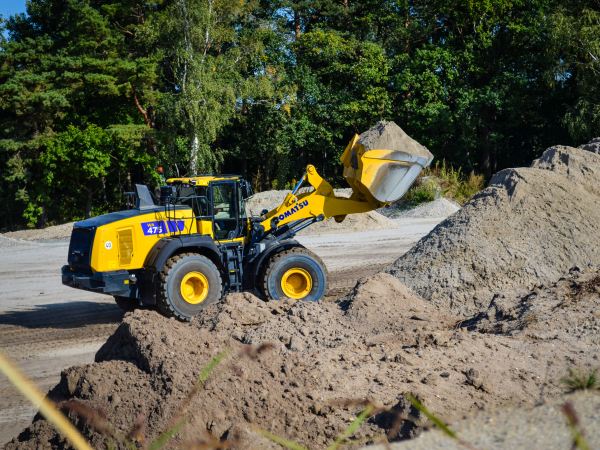A leap forward in performance and efficiency
Vilvoorde, September 2024 — Komatsu is proud to present its latest generation of wheel loaders, the WA475-11 and WA485-11. These two new models are packed with state-of-the-art technology and offer great performance, efficiency, and operator comfort for a maximised customer value.
Unmatched Power and Efficiency
At the heart of new Dash 11 generation wheel loaders is a newly developed Komatsu diesel engine which is characterised by extremely high torque in the low speed range. This new engine is combined with a Komatsu-designed hydro-mechanical-transmission (HMT), resulting in unmatched performance, power reserves, fuel efficiency and ease of operation for all transport and loading tasks.
The WA475-11, for example, demonstrates a 14% improvement in fuel efficiency over its Dash 10 predecessor, while the WA485-11 achieves a remarkable 29% increase in fuel efficiency compared to its predecessor WA480-8.
Thanks to a constant variable gear ratio, the engine stays in a highly efficient fuel zone. Variable speed control makes it possible to individually adapt the machine's maximum speed to the requirements of the job site. The adjustable variable traction control effectively limits wheel spin in difficult ground conditions.
Significant Upgrade in Payload & Bucket Capacity
Compared to its predecessor WA480-8, the WA485-11 has experienced a significant upgrade in payload and bucket capacity. All machine components have been adapted to a permanent payload of 8,800 kg and can even be increased to 9,300 kg in an aggregate handling variant, which helps to reduce the number of loading cycles required depending on the vehicle size.
Reduced Emissions
Komatsu's commitment to sustainability is evident in the new wheel loaders' advanced emissions control systems, which meet EU Stage V standards.
On top of that, the well-proven Komatsu exhaust system includes a diesel particulate filter (KDPF) and, together with the Selective Catalyst Reduction (SCR) system, which further reduces NOx emissions using AdBlue®. These technologies, in conjunction with the particularly low-emission combustion, allows the diesel particulate filter to be replaced only every 8,000 hours; this interval can be extended even further by using particularly low-ash engine oils.
Mastering the Balance between Traction and Lifting power
Another new feature is the variable power control, which enables the lifting speed to be controlled independently of the accelerator pedal. Never before has it been easier for an operator to find the right balance between traction and lifting power. The optimised Z-bar linkage offers up to 20% more lifting power and a higher production rate of tons per hour. Remarkable lifting speed and class-leading machine stability help to increase productivity, especially in tight V-shaped loading applications. In addition, the hydraulic response time and the tipping or lifting speed can be adjusted to specific application requirements.
Operator Comfort ensured by an Ergonomic Design
The new, operator-friendly and spacious cab offers generous all-round glazing and has an interior noise level of just 70 dB(A). The heated rear window is angled, which effectively prevents dirt from sticking on the rear screen. The lever console has a new command control switch and is adjustable on a 5-way axis for each operator. The increased internal air pressure prevents dust and other particles from entering the cab. For easy and safe entry and exit, both machines are equipped with a rear-hinged door, angled steps and large handrails.
A new air-suspended seat dampens vibrations and thus ensures a more comfortable driving experience.
The seat-mounted electronic pilot control levers with a new ergonomic design improve operating comfort and reduce operator fatigue.
Higher Productivity driven by Innovation
The “automatic bucket filling” and other assistance functions help the operator maintain productivity even during long shifts.
A fully digital, high-resolution driver information system provides important machine measurements, including KDPF status and data on AdBlue® levels and fuel consumption. Messages from the ECO control system are displayed in real time during operation and on the exit screen when the ignition is turned off. The ECO control menu allows the operator to check operating logs and fuel consumption. These records are useful for reducing overall fuel consumption and can be saved and sorted by the operator.
Another key innovation is the newly developed Angle-Feedback-Joystick-Steering (AFJS) without a steering wheel, which gives the driver feedback on the steering angle already achieved at any time via the position of the steering lever and is therefore very intuitive to use. Another benefit of this system is the elimination of the steering column, which helps to improve visibility of the work platform and space.
The programmable engine management system automatically switches the engine off when idling or lets the engine run to cool down after leaving the cab and then switches off automatically later.
Minimal Maintenance and Maximum Uptime
Cleaning and maintenance are easier than ever. The radiator fan swings out and automatic reversing function as standard. An electrically tilting hood provides full access to the engine compartment. Additional side doors allow quick and convenient access for daily checks and maintenance. Maintenance costs are significantly reduced, resulting in lower life cycle costs. Full rear fenders are standard, an indicator on the AdBlue® filler cap minimizes overfilling.
KOMTRAX telematics and the Komatsu Care customer maintenance program provide first-class fleet management and support, protecting the machine from misuse and ensuring maximum efficiency and uptime.
The information in this press release is current at the time of announcement and is subject to change without prior notice.
About Komatsu
Komatsu is an industry-leading manufacturer and supplier of equipment, technologies and services for the construction, forklift, mining, industrial and forestry markets. For over a century, Komatsu equipment and services have been used by companies worldwide to develop modern infrastructure, extract fundamental minerals, maintain forests, and create technology and consumer products. The company’s global service and distributor networks support customer operations, tapping into the power of data and technology to enhance safety and productivity while optimizing performance.





































